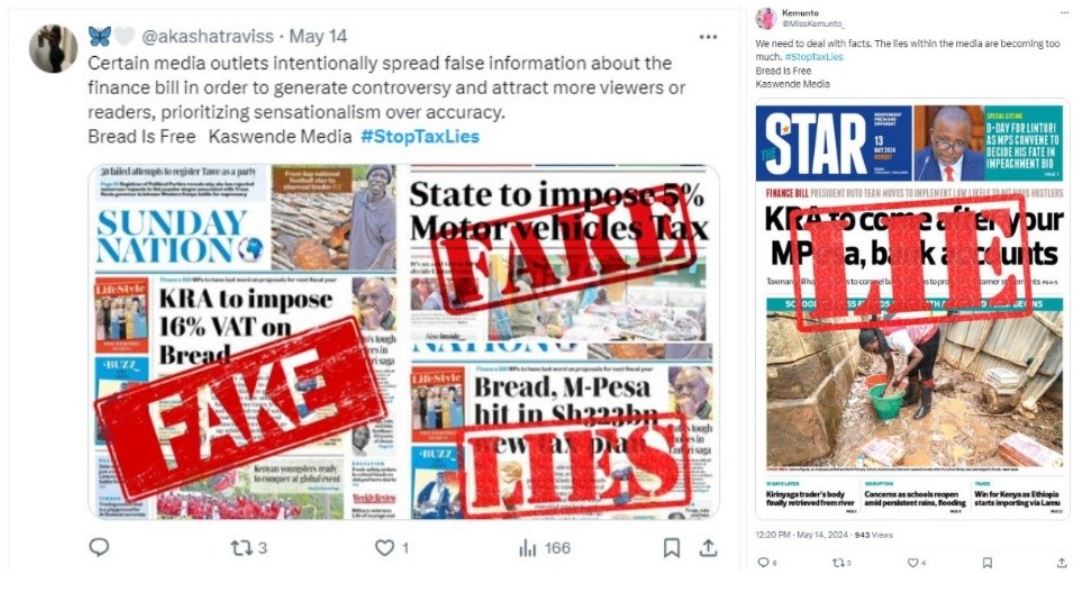As a breakfast staple in Kenya, bread was among the arrangements that stood apart when the costs was revealed.
A comparable claim was duplicated on Facebook.
“No barrel on bread, bikes, prophylactics, sanitary napkins, eggs, milk, animal feeds, pesticides, internet tax just for immigrants, wagering, video gaming, lotto and automobile tax at 1% of worth of cars and truck (sic),” checks out the post.
However this is incorrect.
The costs proposes numerous modifications to the Worth Included Tax (BARREL) on different products, consisting of gluten and unleavened bread, which are presently exempt however will sustain a 16-percent tax if the costs passes.
On the other hand, regular bread, which was formerly zero-rated, will have a tax-exempt status. There is a distinction in between the 2.
“There’s a great deal of false information about the taxes and the financing costs… driven by lack of knowledge.”
Zero-rated products are not taxed at the point of sale, however manufacturers can declare back the barrel paid on inputs. While excused products are not taxed either, manufacturers cannot claw back the barrel paid on inputs.
Economic experts alert that producers would pass the expense onto customers.
Betting, video gaming and lotto services which formerly drew in an import tax responsibility of 12.5 percent will increase to 20 percent tax. In addition, the services will lose the barrel exemption status.
Cash transfer services like M-Pesa, which has more than 30 million regular monthly users throughout Kenya, will likewise sustain a walking in levies. This implies customers will sustain more expenses.
Public assessment about the financing costs ended on June 10, 2024. Economic experts revealed issue that political disinformation may have impacted individuals’s understanding.
“There’s a great deal of false information about the taxes and the financing costs… driven by lack of knowledge,” XN Iraki, an economics speaker at the University of Nairobi, informed AFP Truth Examine.
Just targeted at the abundant?
Politicians and political experts allied with the federal government of William Ruto state the taxes will target the abundant and the middle class while leaving lower-income groups unblemished.
In an interview, chosen senator Karen Nyamu dismissed demonstrations by the poorest bulk, declaring the proposed brand-new levies would not impact them (archived here).
“You might be regreting that Ruto is enforcing heavy taxes on us. However what Ruto has actually done is that he has actually eliminated taxes from the lower class and enforced it, for example, on individuals who are importing products like beds,” stated Nyamu.
“So, you [the lower classes], why are you grumbling when it does not even include you?”
On June 6, 2024, political expert Mutahi Ngunyi aired comparable concepts on his X account, which has 2.3 million fans.
“Ruto is just taxing the abundant,” he composed.
Dear Hustlers: What is your issue? Just 1.2 million Kenyans out of 52 million OWN cars and trucks.40 Countless YOU will never ever own an automobile. Concern: Why safeguard Automobile Owners if you have No Automobile? Likewise: Do Hustlers consume mineral water or utilize Tea bags? NO! Ruto is TAXING the RICH. Is this WRONG?
— Mutahi Ngunyi (@MutahiNgunyi) June 6, 2024
Among the most controversial arrangements of the financing costs proposes an automobile tax set at 2.5 percent of the worth of an automobile, payable every year.
In his post, Ngunyi blasted working-class “hustlers” for fretting about a car tax when “40 countless you will never ever own an automobile”.
However while just a little portion of Kenya’s 51.5 million population own cars, the bulk who depend upon public transportation will still be impacted by the brand-new tax, according to Iraki.
“There’s absolutely nothing like taxing the abundant due to the fact that the bad are not impacted; they are impacted due to the fact that the economy is adjoined,” the economics speaker stated.
“Whatever you perform in one part of the economy impacts the other.”
Customers will balance out the expense sustained through the automobile tax, according to monetary specialist Erastus Omolo Kwaka.
“They will deal with brand-new expenses, and those expenses need to be recuperated from someone,” Kwaka informed AFP Truth Examine.
Causal sequence
Several business have actually left the Kenyan market over high taxes while others have actually scaled down personnel, regional media reported (see here and here).
On June 5, 2024, taxi-hailing business Uber and Bolt threatened to close operations in Kenya if the brand-new costs, which proposes a six-percent tax on gross turnover for non-resident companies, is authorized.
Professionals alert of an unforeseeable tax system, stating it may frighten financiers and decrease the economy.
The World Bank forecasts Kenya’s genuine GDP development will slow to 5 percent this year (archived report).
Parliament was because of discuss the costs on June 18. It needs to pass the last variation before completion of the month.
